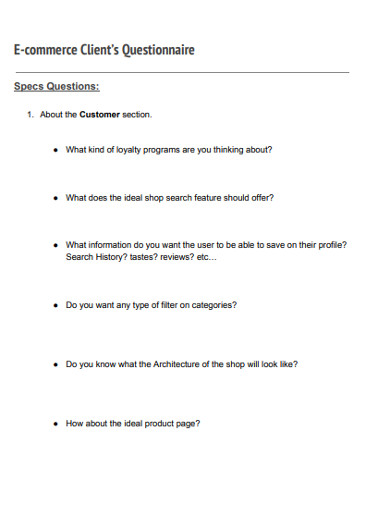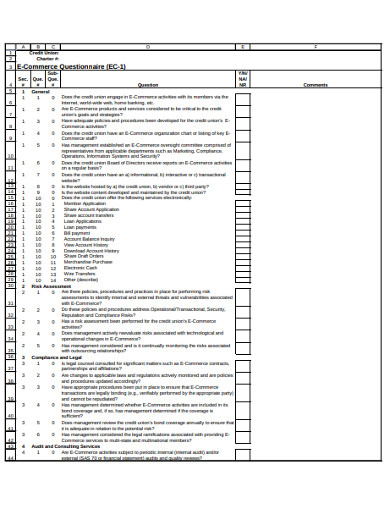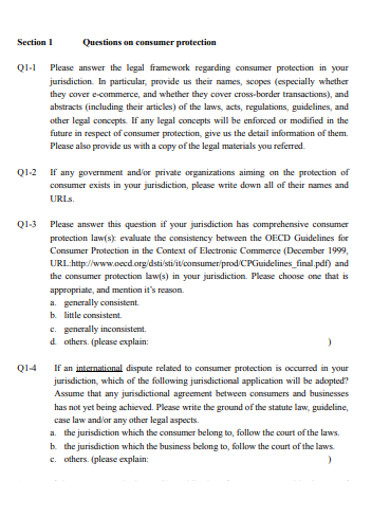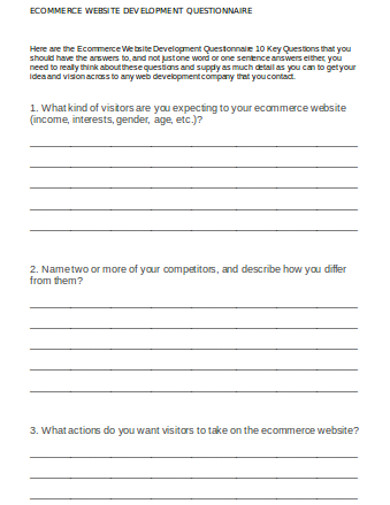E-commerce Website Questionnaire Examples
Come one, come all to a line-free store! More and more business owners are seeing the digital transformation of retail as the best choice in launching their merchandise. Naturally, competition exists in the digital arena. As business owners are working on being distinct from the competition, it is getting challenging for website designers to make the perfect e-commerce website that satisfies every whimsy. The best way to come about this is to see the vision through your clients’ eyes.
E-commerce website questionnaires are forms that your clients will fill in to paint you a picture of their ideal website. It is a prepared comprehensive list of questions about the site’s components and technicalities that the clients go through during consultation. When you know what your clients want, you can meet, even exceed, their expectations. Client satisfaction is an important asset in your industry where you compete with novice to veteran designers from all around the globe.
Since e-commerce is becoming an essential part of the retail industry, there is a rise in web design websites and apps that offer interested people the chance to create and slightly customize their sites for a fee. Whether you are preparing templates or designing from scratch, you should always keep the clients’ interest in mind. It’s about what they want and how you can deliver that. Questionnaires are an effective survey tool for getting the right information for the design.
Questionnaires are cost-effective, and they are easy to reproduce. Instead of going through hours of talking with a single client to collect all the information that you need, you can integrate e-commerce website questionnaires during consultations. You will be able to refer to the necessary information over and over. You need not work from memory or through the hurried scribbles in your notebook.
The Digital Mall
Along with the dot-com rage in the early 90s, Amazon started selling books on the Internet. It was still an emerging business platform, but Jeff Bezos had a vision. After the success of its book sales, the company branched out to the media industry, selling music and movies before iPod and streaming services were available. Later on, Amazon became a host to more products and services as Bezos foresaw that people will want to buy goods on the Internet. Online shopping was made even more convenient with shipping deals like free shipping and same or next-day delivery options, as well as privileged discounts and deals. Online retail was making a dent in the sales of physical retail outlets.
And business owners were noticing. If you can’t beat the convenience that the online stores dangle in front of the consumer’s wallets, join them. These days, a significant number of people prefer shopping online in the comfort of their couch than physically queuing in traditional retail stores. Businesses have to keep up with this shift in consumer preference or risk losing to competition. E-commerce websites are improving and becoming more intuitive. Online deals and discounts are flooding the people’s email inbox and social media feed. Companies and small businesses are either hiring their own digital team or consulting independent website designers. The Internet made the retail shift possible, and Amazon catalyzed the boom.
3+ E-commerce Website Questionnaire Examples & Templates
Get yourself the perfect e-commerce website questionnaire that works for you and your job. A well-made questionnaire makes the right impression with your clients that you take their needs seriously. Browse through the following samples of questionnaires for an inspiration.
1. E-commerce Client’s Website Questionnaire Example
2. Sample E-commerce Website Questionnaire Example
3. E-commerce Legal Website Questionnaire Example
4. E-Commerce Website Questionnaire in DOC
Preparing An E-Commerce Website Questionnaire
As a website developer and designer, you know how valuable the specificity of the demand is. You are about to put in a lot of hard work into designing the perfect website for your client. When you just rely on hunches and safe guesses, you won’t be able to deliver what they expected and paid for. You and your client must be on the same page concerning the form and function of the website. Before you start working on website development, keep a note of the following information.
1. What Products Do You Sell?
Ask your clients to describe the website content they plan to have. They might want to have an Amazon-like site where they can also host other shops on their website. These websites are like malls where there is a shop for almost everything, from fresh food to automobile spare parts. They may also want a smaller website that houses only a specific type of good, like a beauty-products-only store. You also have to have an idea of how many products do the clients want to sell on the site. It helps with web design, like in the number of pages, as well as the way the products are distributed and displayed on each page.
2. Who Are The Prospect Visitors?
The clients should also give an idea of who are likely to visit their site. This information matters in the entire design of the website. For example, if the products are for corporate professionals, then you wouldn’t want the website to look like a rainbow exploded inside and left glitters all over the place. These people might not have the time to scroll through bottomless content just to get the right kind of suede vest. The architecture of the new website should attract the right kind of customers. To whom should the site appeal to?
3. Do You Have A Design In Mind?
Perhaps your client has been doing his or her own research before coming to you for help. They may have a specific theme or design in mind for the website. They may want their e-store to exude a certain personality or atmosphere to attract a specific group of consumers. For example, they may want their vegan product shop to have earthy tones and shades. Or you may come across a client wanting to set up an e-shop for minimalist clothes. Of course, you wouldn’t showcase these products on a website with loud kaleidoscopic colors. That wouldn’t be staying true to the brand’s message.
4. How Will People Transact?
You should also know about the clients’ preferred mode of contact and transaction. For example, they may want that inquiries be sent only via email. Or they may want auto-responders to assist the visitors in shopping. They could also have a built-in chat or phone support for immediate help. The clients should also declare the type of payment that they would want in their shop. Do they want Visa, American Express, Paypal, or Bitcoin? Or would they rather that shoppers send the payment to a designated bank account?
5. What Is Your Marketing Strategy?
Your clients may have a specific online marketing strategy in mind for their shop. They may want social media integration wherein the site visitor can share his or her shopping experience directly to social media via the store. They may also use CMS/blogs or SEO in their marketing. You may also suggest creating an email list for visitors to get email updates on sales and promotions. Your customers may want to see options that you can provide, so keep this question open-ended. You can also research on digital marketing strategies that you can suggest to your clients when they would inquire.
6. What Is Your Budget?
All the work that you will render comes with a price, of course. The cost of human labor, software, and hardware into making the client’s vision a reality do not come cheap. Talks about money may not be the most comfortable conversation to have in person. Questionnaires can also help you here because the question is already indicated in the form. Knowing the budget also lets you and your clients reduce the number of options so that you can decide on the perfect website.
7. How Did You Learn About Me?
You are running a business. You need customers, too. Therefore, you should ask the clients about where they found your services. Maybe they found you because of your Facebook ad. Or their peers recommended you to them. When you know how your clients knew about you, you can invest your marketing resources on either boosting your social media ads more or creating business cards that you can distribute to your clients.
Web and graphic designers are taking on the challenge to make each e-commerce website project a cut above the rest. Close correspondence and accurate communication are essential in meeting the demand and hitting the target. Orient your questionnaires to make this job lighter for you. This document isn’t just an office form; it is the window into your clients’ minds.






